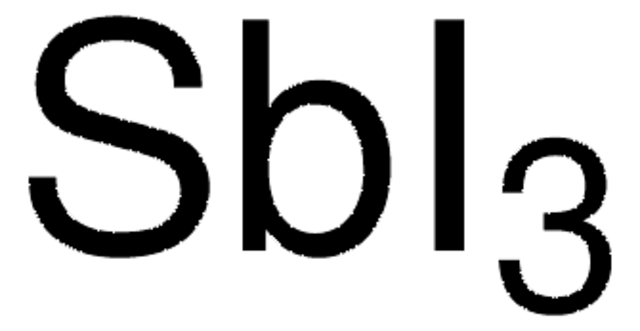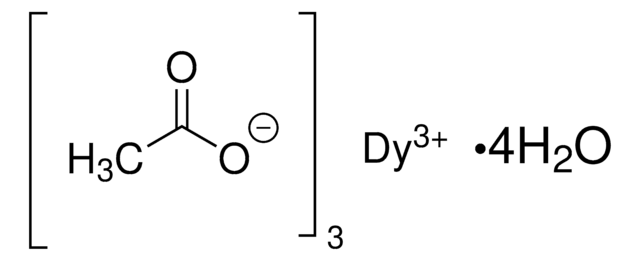483265
Antimony(III) acetate
99.99% trace metals basis
Sinónimos:
Antimony acetate, Antimony triacetate, Triacetoxystibine
About This Item
Productos recomendados
assay
99.99% trace metals basis
form
solid
reaction suitability
core: antimony
reagent type: catalyst
mp
126-131 °C (lit.)
density
1.22 g/mL at 25 °C (lit.)
SMILES string
CC(=O)O[Sb](OC(C)=O)OC(C)=O
InChI
1S/3C2H4O2.Sb/c3*1-2(3)4;/h3*1H3,(H,3,4);/q;;;+3/p-3
InChI key
JVLRYPRBKSMEBF-UHFFFAOYSA-K
Application
- New Complexes of Antimony(III) with Tridentate O,E,O-Ligands: Explores new antimony(III) complexes providing insights into their bonding and potential applications in materials science (U Böhme, M Herbig, 2023).
- Antimony (III) acetate as a catalyst for synthesis of xanthenes: Details the use of antimony(III) acetate as a catalyst in the synthesis of biologically active compounds, showcasing its efficiency in organic chemistry (F Hakimi, A Hassanabadi, 2015).
signalword
Warning
hcodes
Hazard Classifications
Acute Tox. 4 Inhalation - Acute Tox. 4 Oral - Aquatic Chronic 2
Storage Class
11 - Combustible Solids
wgk_germany
WGK 2
flash_point_f
Not applicable
flash_point_c
Not applicable
Certificados de análisis (COA)
Busque Certificados de análisis (COA) introduciendo el número de lote del producto. Los números de lote se encuentran en la etiqueta del producto después de las palabras «Lot» o «Batch»
¿Ya tiene este producto?
Encuentre la documentación para los productos que ha comprado recientemente en la Biblioteca de documentos.
Los clientes también vieron
Nuestro equipo de científicos tiene experiencia en todas las áreas de investigación: Ciencias de la vida, Ciencia de los materiales, Síntesis química, Cromatografía, Analítica y muchas otras.
Póngase en contacto con el Servicio técnico










